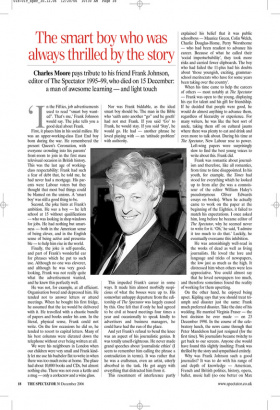The smart boy who was always thrilled by the story
Charles Moore pays tribute to his friend Frank Johnson, editor of The Spectator 1995–99, who died on 15 December: a man of awesome learning — and light touch ‘In the Fifties, job advertisements used to read “smart boy wanted”. That’s me,’ Frank Johnson would say. The joke tells you a good deal about Frank. First, it places him in his social milieu. He was an upper-working-class East End boy born during the war. He remembered the present Queen’s Coronation, with everyone crowding into his parents’ front-room to join in the first mass televisual occasion in British history. This was the last age of workingclass respectability: Frank had such a fear of debt that, he told me, he had never had a mortgage. His parents were Labour voters but they thought that most bad things could be blamed on the unions. A ‘smart boy’ was still a good thing to be.
Second, the joke hints at Frank’s ambition. He was a boy — he left school at 15 without qualifications — who was looking in shop windows for jobs. He had nothing but smartness — both in the American sense of being clever, and in the English sense of being active and presentable — to help him rise in the world.
Finally, the joke is self-parodic, and part of Frank’s wonderful ear for phrases which he put to such use. Although no one was cleverer, and although he was very goodlooking, Frank was not really quite what the advertisement wanted, and he knew this perfectly well.
He was not, for example, at all efficient. Organisation bored and depressed him. He tended not to answer letters or attend meetings. When he bought his first fridge, he assumed that the ice would be delivered with it. He travelled with a chaotic bundle of papers and books under his arm. In the literal, physical sense, Frank could not write. On the few occasions he did so, he tended to resort to capital letters. Many of his best columns were dictated down the telephone without ever being written at all.
We were his neighbours in London when our children were very small and Frank kindly let me use his bachelor flat to write in when there was too much noise at home. The place had about 10,000 books and CDs, but almost nothing else. There was not even a kettle and a mug — only a corkscrew and a wine glass. Nor was Frank biddable, as the ideal smart boy should be. The man in the Bible who ‘saith unto another “go” and he goeth’ had not met Frank. If you said ‘Go’ to Frank, he would stay. If you said ‘Stay’, he would go. He had — another phrase he loved playing with — an ‘attitude problem’ with authority.
This impeded Frank’s career in some ways. It made him almost morbidly suspicious of what the bosses were up to. His somewhat unhappy departure from the editorship of The Spectator was largely caused by this. One felt that if only he had agreed to be civil at board meetings four times a year and occasionally to speak kindly to advertisers and business managers, he could have had the run of the place.
And yet Frank’s refusal to bend the knee was an aspect of his journalistic genius. It was totally unself-righteous. He never made grand speeches about ‘journalistic ethics’ (I seem to remember him calling the phrase a contradiction in terms). It was rather that he was a craftsman, even an artist, utterly absorbed in the task. He got angry with everything that distracted him from it.
This resentment of interference partly explained his belief that it was public schoolboys — Maurice Green, Colin Welch, Charlie Douglas-Home, Perry Worsthorne — who had been readiest to advance his career. Because of what he called their ‘social imperturbability’, they took more risks and carried fewer clipboards. The boy who had failed the 11-plus had his doubts about ‘those youngish, exciting, grammarschool meritocrats who have for some years been taking over the country’.
When his time came to help the careers of others — most notably at The Spectator — Frank was open to the young, displaying his eye for talent and his gift for friendship. If he decided that people were good, he would do almost anything to advance them, regardless of hierarchy or experience. For many writers, he was like the best sort of uncle, taking them off on cultural jaunts where there was plenty to eat and drink and even more to talk about. During his time at The Spectator, New Labour rose to power. Left-wing papers were surprisingly slow to find the best young voices to write about this. Frank did.
Frank was romantic about journalism and therefore, like all romantics, from time to time disappointed. In his youth, for example, the Times had stood for everything which he looked up to from afar (he was a connoisseur of the editor William Haley’s pseudonymous Oliver Edwards essays on books). When he actually came to work on the paper at the beginning of the Eighties, it failed to match his expectations. I once asked him, long before he became editor of The Spectator, why he seemed never to write for it. ‘Oh,’ he said, ‘I admire it too much to do that.’ Luckily, he eventually overcame this inhibition.
He was astonishingly well-read in the works of dead as well as living journalists. He loved the lore and language and tricks of newspapers, the low just as much as the high. It distressed him when others were less appreciative. You could almost say that he loved newspapers too much, and therefore sometimes found the reality of working for them upsetting.
On the other hand, he enjoyed being upset. Kipling says that you should treat triumph and disaster just the same: Frank much preferred disaster. Take the date of his wedding. He married Virginia Fraser — the best decision he ever made — on 23 December 1998. In the course of the celebratory lunch, the news came through that Peter Mandelson had just resigned (for the first time). We journalists became twitchy to get back to our screens. Anyone else would have found this slightly insulting: Frank was thrilled by the story and sympathised entirely.
Why was Frank Johnson such a good journalist? It was to do with his range of and depth of knowledge — American, French and British politics, history, opera, ballet, music hall (no one better on Max Miller), some sport, steak and kidney pie, gossip — and with his prodigality of ideas.
Even more, though, it was to do with tone — an understanding of what could and could not be done with his chosen genre — above all, his sketches in the Daily Telegraph and the Times. Both in conversation and in print, Frank had such lightness. He often thought that modern government was a ‘conspiracy against the governed’, but it was a ‘slapstick kind of conspiracy’, and so he refused to get pompous about it. Instead he was funny, the funniest.
I have seen it said somewhere that his journalism does not bear rereading. This is not necessarily an insult to journalism, since we write for the moment, but in Frank’s case it is quite untrue (I have just tested the theory by rereading Out of Order, a collection published in 1982). Frank combined observation and wit and fantasy to tell us about the times he lived in, and as soon as you read it (I recommend, for example, Mrs Thatcher in the chocolate factory in May 1979), you know what you need to know about the event described.
Always, in writing and in life, the charm. Once a colleague brought her young and naughty son into work. Well-meaning people asked him questions about school which he refused to answer. Eventually Frank and the seven-year-old walked out together to the car-park. Frank pointed to his vehicle. ‘See that car,’ he said, ‘I stole it.’ The lad’s eyes widened in admiration. From youth, through success, through seven years of terrible cancer, to death aged 63, Frank was always the same dear, smart boy.
Frank Johnson, 20 January 1943– 15 December 2006.





































 Previous page
Previous page